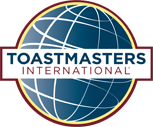
INVOCATION/PLEDGE/REPORTER FUNCTION
You’ve just received the new schedule, and you are scheduled as the I/P/R. "Oh, an easy job," you think. But what is this job, exactly? I/P/R stands for Invocation, Pledge, and Reporter duty. Let’s take a moment to reflect on what it takes to be successful as I/P/R.
Toastmaster’s International Board of Directors Position on Invocations, from the November 2001 "TIPS" newsletter::
"An invocation is an optional part of Toastmasters International meetings, as well as club meetings. Toastmasters International neither encourages nor discourages the use of an invocation, but recognizes that it is a public speaking opportunity and may be included to broaden member experience. If an invocation is presented, the speaker should be sensitive to the diversity of cultures and religions in the audience. A pledge to the flag or other recognition of the host country is optional at Toastmasters International meetings as well as at club meetings. Participation is always optional."
Invocation:
According to the dictionary, an invocation is "the act or process of petitioning for help or support; a prayer of entreaty". At Papago Toastmasters, we use the invocation to give thanks for our health and welfare, or to ask blessings for our members as they seek to improve their lives. A prayer should be generic in nature, respecting the diversity of religions represented by our members.
Thought:
For those who are uncomfortable with praying in public, an alternative is to offer an inspirational thought (or "thought of the day"). Often thoughts are quotes from others, or (very) short stories. Something to make you stop and go "hmmm." A general guideline is to limit your story to one minute or less. Anything longer should be saved for a speech or table topic event.
Pledge:
Ask your audience to face the flag. Place your hand over your heart, and begin loudly "I Pledge Allegiance," then drop your voice as the audience joins in. Avoid saying the pledge the way you learned it in kindergarten. Speak the words in sentences, pausing only where there are commas.
Which comes first?
The rule "God before country" applies here. If you choose to give a prayer, share it before leading the pledge of allegiance. If you choose to share an inspirational thought, it should be presented after the pledge.
Reporter:
We’ve discovered that many of our members do not realize that the I/P/R person is responsible for completing the Reporter form. This form is used to record the attendance of our members, and the activities of the day, including guests, description of the speeches, and the winners of the awards. This form is then given to the club secretary as an official record of the meeting. Keeping this record allows club officers to re-create speaking history, and to establish the winners of our annual awards and other recognition. The Sgt. At Arms puts a copy of the form out at the beginning of each meeting for this purpose.
To stand or not to stand?
Now that you know what you are doing, how do you do it?? The invocation and pledge may be performed from your seat, or you may choose to come forward to the front of the room, depending on your comfort level. We always stand for the Pledge, and it is traditional to stand for an invocation. The audience should be seated if you are giving a "thought of the day." Be sure to give instructions to the audience to minimize confusion. "Please rise," or "please be seated" ensures the audience knows what to do.
The I/P/R is an important function, and often assigned to newer members of the club. For those of you assigned as mentors to new members, keep a copy of this article to share with your protégée to help guide them through this assignment. The I/P/R is a job with big responsibilities and Papago will be a better club for your efforts!
Printer Friendly Version
